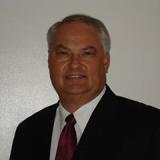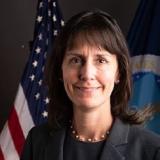Who We Are
Executive Council
The National Integrated Drought Information System (NIDIS) Executive Council provides the NIDIS Program Office with an opportunity to engage in individual consultation with senior resource officials from NIDIS’s leading federal partners (such as USDA, DOI, and others) as well as leaders from state and local government, academia, nongovernmental organizations, and the private sector.

Tony Willardson was named as Executive Director of the Western States Water Council in July 2009. The Council, representing 18 states, was created by western governors in June 1965, and members are appointed by their governors. Formerly the Deputy Director, Tony joined the Council in 1979. He holds a B.A. in political science from Brigham Young University and an M.S. in public administration from the University of Utah. He is a member of the National Honor Society for Public Affairs and Administration (Pi Alpha Alpha). He oversees publication of a weekly newsletter, Western States Water, which he edited for many years. He is the author of numerous articles and reports covering a wide range of water resource issues, including drought, water project financing and cost sharing, groundwater management and recharge, water conservation, water use fees, remote sensing of water use, and inter-regional water transfers. He is one of the principal authors of the Western Governors’ Association’s (WGA’s) 2006 report, Water Needs and Strategies for a Sustainable Future, and the subsequent 2008 Next Steps Report, as well as the related Western States Water Council 2010 Progress Report. He also was a contributing editor to the WGA’s December 2012 report, Water Transfers in the West: Projects, Trends, and Leading Practices in Voluntary Water Trading. He oversees development of the Council’s Water Data Exchange.

Dr. Roger S. Pulwarty is the Senior Scientist in the National Oceanic and Atmospheric Administration (NOAA) Physical Sciences Laboratory at the NOAA Office of Oceanic and Atmospheric Research in Boulder, Colorado. He was previously the Senior Advisor for Climate Research in NOAA’s Climate Program Office. His research and publications focus on climate, impacts assessment, and adaptation in the U.S., Latin America, and the Caribbean. Roger is a lead author on a number of national and international climate assessments, including the UN International Strategy for Disaster Reduction Global Assessment of Disasters and the UN International Panel on Climate Change (IPCC) Special Reports on Water Resources and on Extremes. He is a convening lead author on Adaptation Planning and Implementation in the 2014 IPCC Fifth Assessment Report. Dr. Pulwarty has acted in advisory capacities on climate, natural resources, and disaster risk reduction to several national and international agencies, including the Organization of American States, the Caribbean Economic Community (CARICOM), the Global Framework on Climate Services, the UN Development Programme, UN Environment Programme, and the InterAmerican Development and World Banks. He co-chairs the UN World Meteorological Organization Climate Services Information System implementation team and the White House Committee on Environment, Natural Resources, and Sustainability Task Force on the Water-Energy-Food nexus. Roger has provided testimonies before the U.S. Congress on climate, adaptation, and natural resources, served on science advisory committees of the U.S. National Academy of Sciences, and is regularly called on by media outlets, including the New York Times and the BBC. He is the co-recipient of NOAA Administrator and U.S. Department of Commerce awards for linking science and decision making, and is the recipient of the 2014 Gold Medal in Applied Sciences and Technology from the Government of Trinidad and Tobago. Roger is Professor-Adjunct at the University of West Indies and the University of Colorado, Boulder.

In her role as the U.S. Department of Agriculture (USDA) Deputy Chief Economist, Dr. Nickerson advises the Chief Economist, the Secretary, and top policy officials regarding the economic implications of programs, regulations, and legislative proposals affecting the U.S. food system and rural areas. Dr. Nickerson’s career at USDA has spanned 20 years. Prior to joining the Office of the Chief Economist, she was the Director of the Market and Trade Economics Division at USDA’s Economic Research Service (ERS) and earlier served on the management team of the ERS's Resource and Rural Economics Division. In these leadership roles she oversaw and influenced research on a broad range of topics related to the agricultural economy, global markets and trade, rural economy, socially disadvantaged farmers, conservation, and resources and the environment. She served on the White House’s Council of Economic Advisers in 2013–2015, where she provided economic advice on administration initiatives and regulatory actions relating to agriculture, climate change, economic development, transportation, rural child poverty, and evidence-based policymaking. She also served as CEA liaison to the White House Rural Council. Dr. Nickerson received her Ph.D. in Agricultural and Resource Economics from the University of Maryland, an M.S. in Environmental Studies from California State University, and a B.S. in Accounting from Towson University.
Executive Council Members
NIDIS Program Office Staff
The NIDIS Program Office resides within the NOAA Climate Program Office, which is part of NOAA’s Office of Oceanic and Atmospheric Research. Located in Boulder, Colorado, the NIDIS Program Office is hosted by the Physical Sciences Laboratory in NOAA’s Earth System Research Laboratory.

Veva Deheza is responsible for the implementation of the Public Law that authorized NIDIS in 2006. She supports agency congressional, legislative, and policy priorities to achieve the NIDIS mission, goals, and objectives. She is a NOAA/NIDIS co-lead on the National Drought Resilience Partnership, and she serves as the NIDIS liaison for the Western Governors’ Association/NOAA memorandum of understanding and the Western States Water Council. Veva Deheza oversees a staff that coordinates all NIDIS regional drought early warning systems around the country, ensuring that regional successes and lessons learned are connected and linked to each other to create an integrated national drought early warning information system.




Regional Drought Information Coordinators
A Drought Early Warning System (DEWS) is a network of regional and national partners that share information and coordinate actions to help communities in the region cope with drought. The Regional Drought Information Coordinators support these regional networks, working with partners across all levels of government, academic institutions, and the private sector to improve capacity to monitor, forecast, plan for, and cope with the impacts of drought.


Communications Staff


In Memoriam

Elizabeth Weight was a beloved colleague and will forever be a part of NIDIS. She joined the NIDIS Program Office in 2017 as Coordinator of the Intermountain West and Southern Plains Drought Early Warning Systems, and later served as a Program Coordinator. Elizabeth laid the groundwork and led many strategic areas of the NIDIS program, from drought response to partnership development, from organizing a national drought webinar series to supporting drought impact assessments across the U.S. Southwest, and so much more. Elizabeth passed away on October 28, 2021, after a ferocious battle with cancer. She left behind an incredible legacy of service, leadership, friendship, and dedication to drought-vulnerable populations at home and around the world.
* Denotes an employee of the Cooperative Institute for Research in Environmental Sciences (CIRES) at the University of Colorado Boulder.
** Denotes an employee of the Cooperative Institute for Research to Operations in Hydrology (CIROH) at the University of Alabama.
Drought.gov Staff
NIDIS partners with the National Centers for Environmental Information (NCEI) for technical support, operational support, and continued development of the U.S. Drought Portal (Drought.gov). The hosting requires a mix of IT administration, data management, web development, content management support, research, and external collaboration.

Steve is the U.S. Drought Portal Program Manager at NCEI in Asheville, North Carolina. Steve has a background in a variety of GIS, data management, and visualization activities within NOAA, including radar, satellite, and severe weather datasets. He is also the primary author of the NOAA Weather and Climate Toolkit software application.












